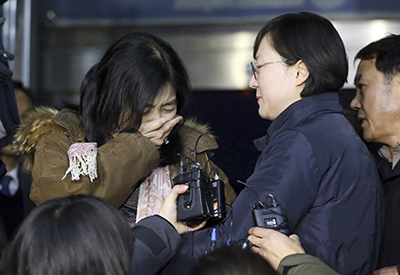South Korea has been hailed by many as a bastion for democracy and press freedom, especially in comparison to its twin to the north, which for years has been featured on the Committee to Protect Journalists’ most censored list. However the recent stifling of critical voices in South Korea, including cases of arrests, deportation, and criminal defamation hearings in the past seven days, indicates a worrisome climate for press freedom and free expression.
On Friday, independent journalists Choo Chin-woo and Kim Ou-joon appeared before an appeals court in Seoul for a ruling in the criminal defamation case brought against them for their reporting, according to news reports. The co-hosts of satirical podcast “Naneun Ggomsuda,” who say they have 10 million listeners, had been accused of defaming the brother of President Park Geun-hye, according to news reports. The appeals court acquitted the journalists but their case, and three others this week, have highlighted just how precarious the climate for free expression in South Korea is.
On January 14, South Korean prosecutors announced they had arrested Hwang Sun, a former politician and pro-unification activist, on charges of breaking the country’s National Security Law, which prohibits praise, encouragement, or propaganda for North Korea, news reports said. The two neighbors signed an armistice in 1953 after the three-year Korean War but remain in a technical state of war. Hwang has been accused of making sympathetic comments on a YouTube channel and writing blog posts praising North Korea’s founder Kim Il Sung, according to news reports.
Hwang’s arrest comes on the heels of the deportation on January 10 of Korean-American writer and talk show host Shin Eun-mi. Authorities placed Shin under a three-week travel ban and then deported her to the U.S. for making positive comments about life in North Korea in online posts and public talk shows around the country, some of which she made alongside Hwang, reports said. Shin had posted stories about her trips to the North on OhmyNews, one of the largest South Korean news organizations.
Her book, Korean-American Ajumma Goes to North Korea, which chronicles her visits to the country, was featured on a government-recommended reading list in 2013 and she was invited to discuss her experiences in North Korea in talk shows with Hwang. Amid the recent outcry, the book was taken off the list by the Ministry of Culture, and officials said they plan to recall hundreds of copies that were distributed to libraries across the country, reports said.
“I don’t believe I undermined the national security of South Korea,” she told the media. “If I did, why did the government select my book as a recommended one in the first place? I just gave lectures and filmed a documentary based on the book.”
Shin has been barred by South Korean authorities from entering the country for five years. Hwang is in custody, awaiting trial. Both of them deny the charges.
In a rare show of criticism, the U.S. State Department expressed concern over Shin’s case. Jen Psaki, a State Department spokeswoman, told reporters, “We’re concerned that the National Security Law, as interpreted and implied in some cases, limits freedom of expression and restricts access to the Internet.”
In an indication of just how sensitive the issue of North Korea can be in the south, in December an 18-year-old student threw a burning pot of gasoline and sulfuric acid at the stage during one of the talk shows hosted by Hwang and Shin, injuring at least two people, according to reports. “The issue of how to deal with North Korea is an important cleavage in the South Korean political system and its influence can be seen on these issues,” wrote Professor Stephan Haggard and Professor Jong-sung You of University of California, San Diego in their findings, published in the Journal of Contemporary Asia in October 2014.
These recent arrests and instances of legal action are not isolated cases.
In November, aides to President Park filed a criminal defamation complaint against six staffers at the privately owned daily Segye Ilbo after the paper reported on a leaked internal document from the president’s office, reports said. In its November 28 edition, the paper alleged that Park’s former and current aides were locked in a power struggle and were meddling in state affairs, according to local reports. Park, whose approval ratings took a plunge during this time, denies the allegations, according to reports.
And in October, prosecutors charged Tatsuya Kato, Seoul bureau chief of the Japanese daily Sankei Shimbun, with criminal defamation after he reported rumors that the president was absent for several hours during the April 2014 ferry disaster that left hundreds dead, because she had been with a man. Kato’s trial began in late November and a decision has yet to be made in the case. This week his travel ban, in place since August, was extended for another three months, news reports said.
According to Human Rights Watch, South Korea’s criminal defamation law focuses on whether what was reported was in the public interest, rather than whether it was accurate. Defendants typically bear the burden of proof and, if found guilty, can face up to three years in prison or a fine up to 20 million won ($18,500) for cases involving information found to be true. Defendants found using “openly false facts” can face up to seven years in prison or fines up to 50 million won ($46,400), the group reported.
Critics say that such laws are at odds with a liberal democracy, and that Park is following in the footsteps of her authoritarian father Park Chung-hee, who ruled the country from 1961 to 1979. Since the end of military-controlled rule in 1987, South Korea has fluctuated between liberal and restrictive administrations, CPJ research shows.
